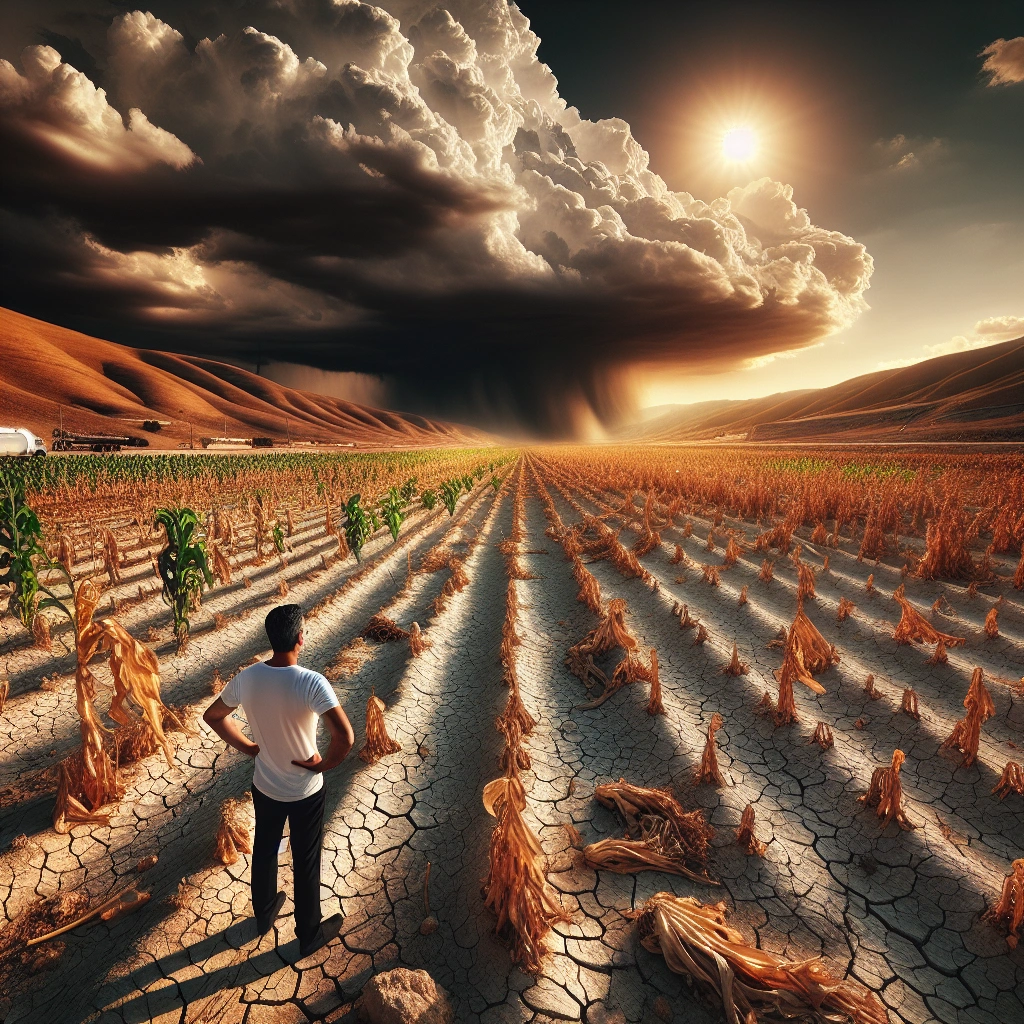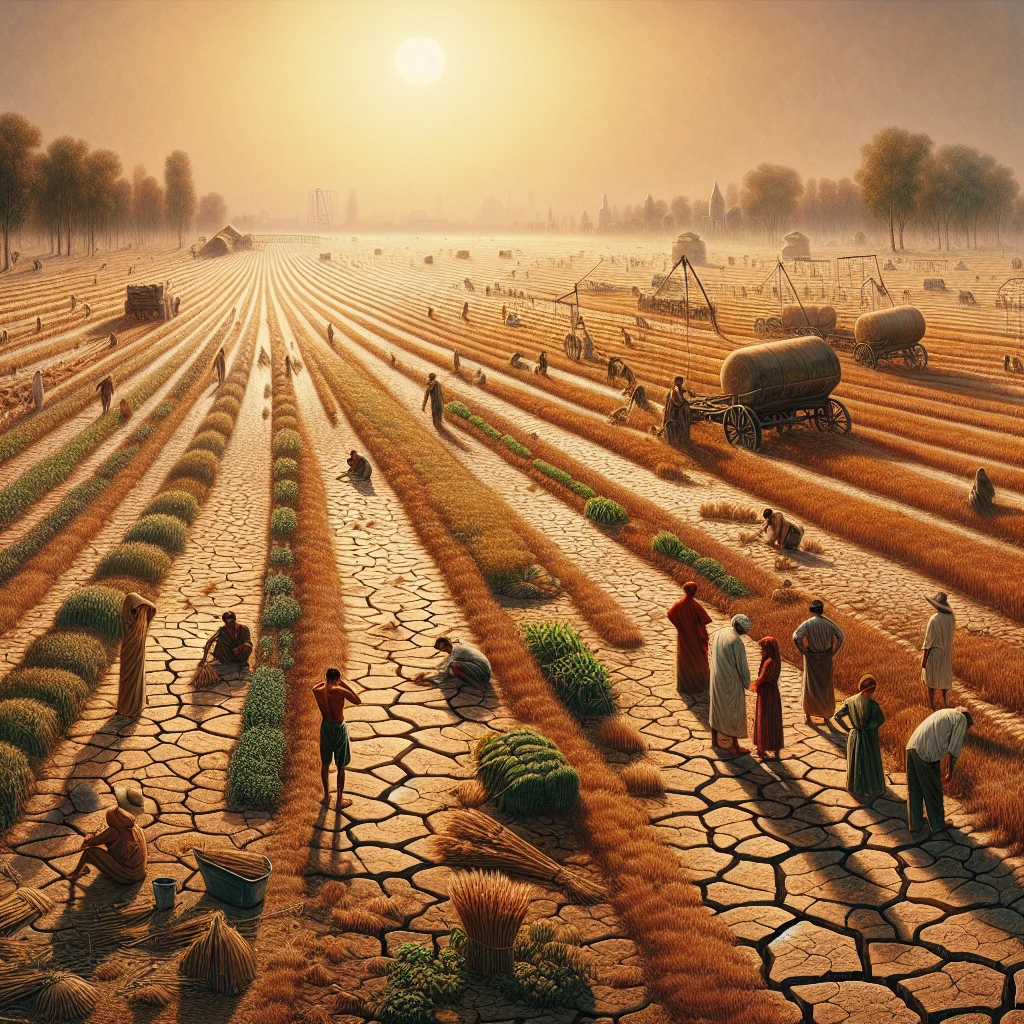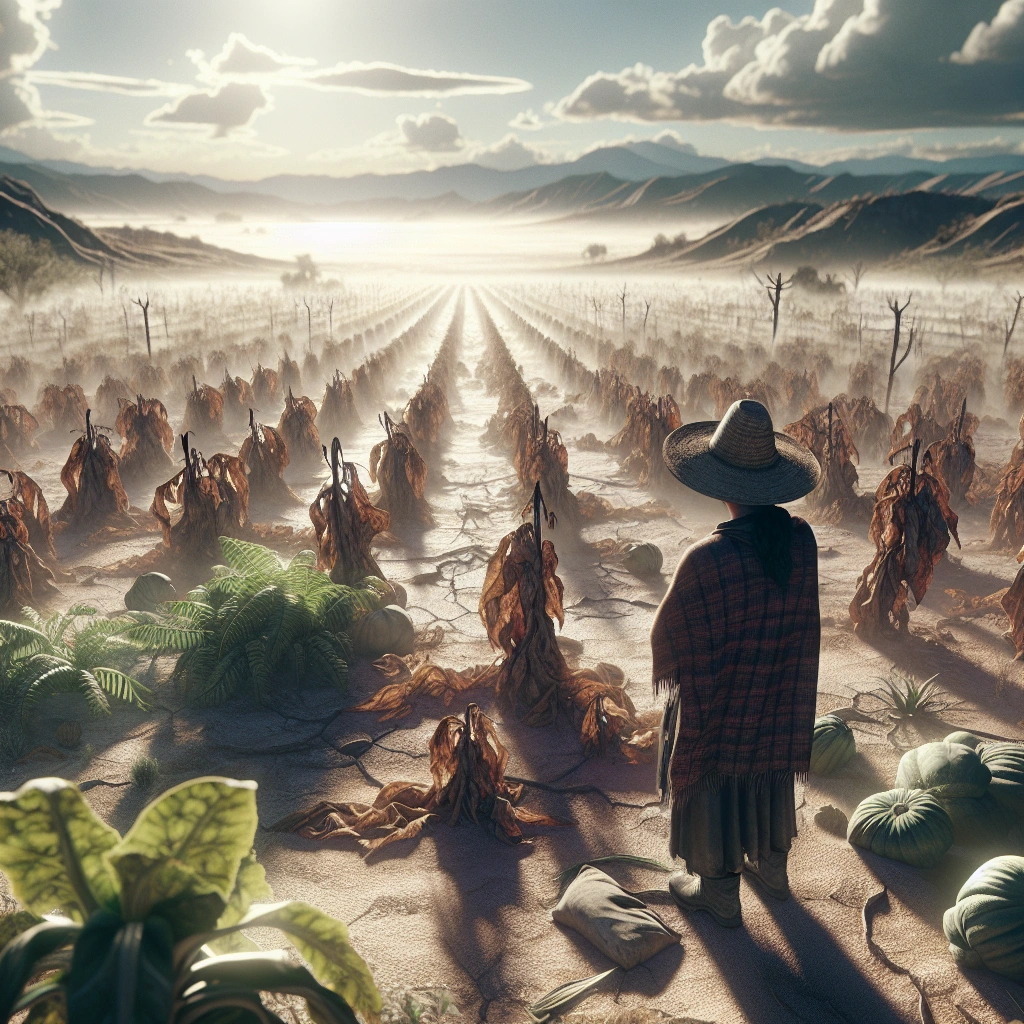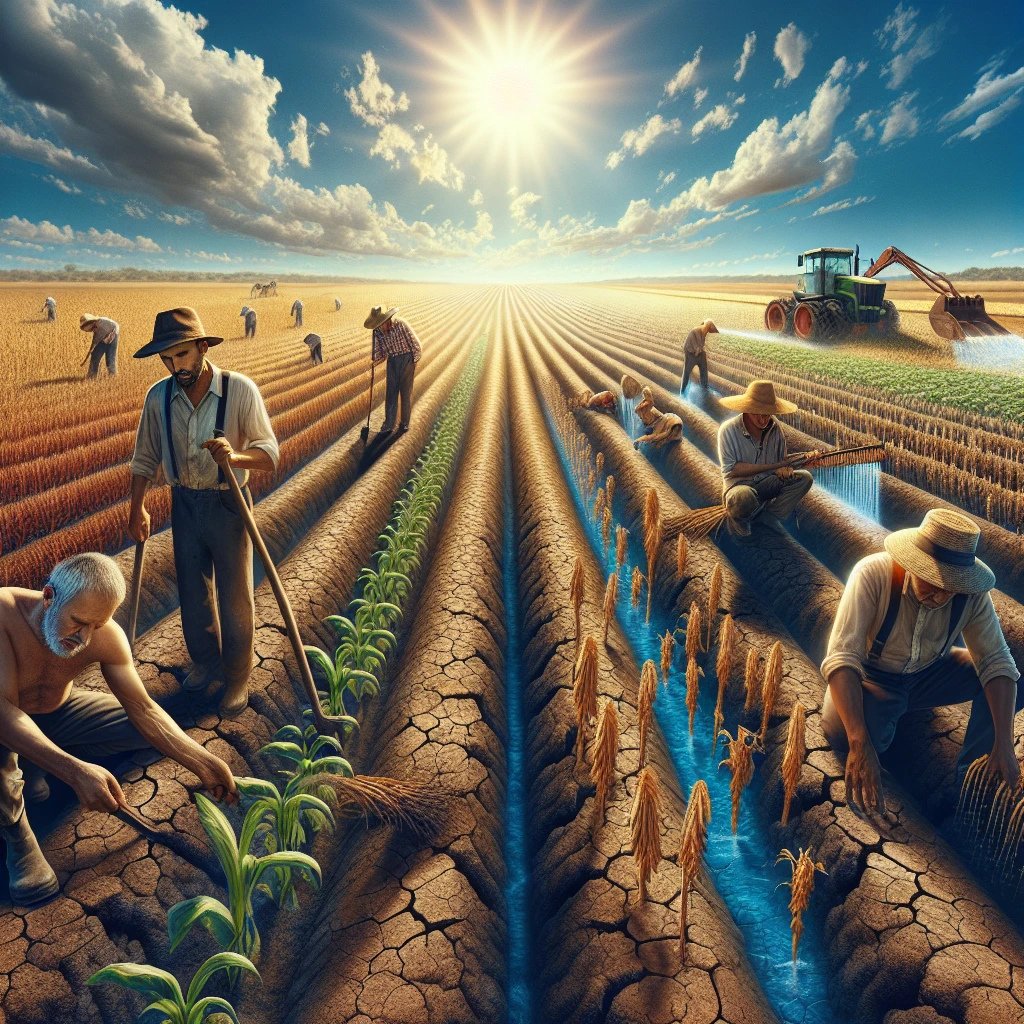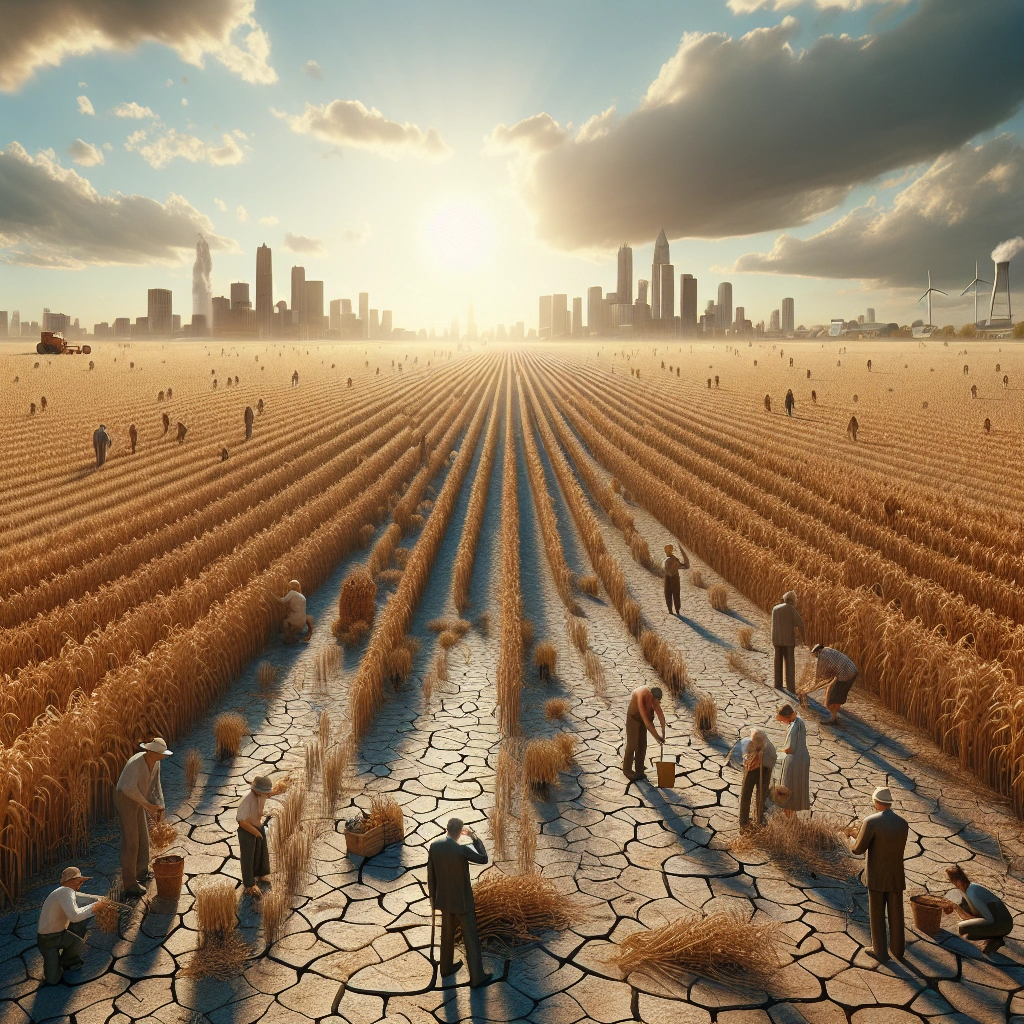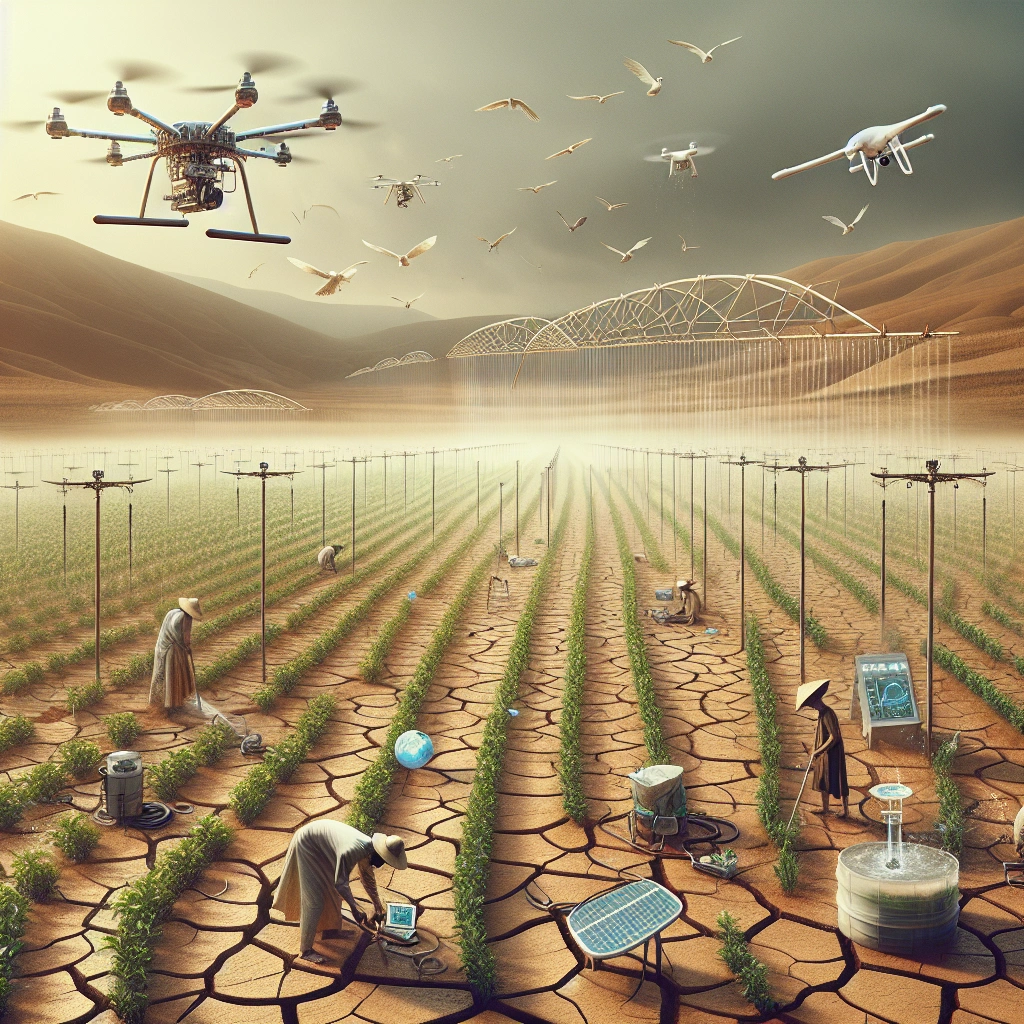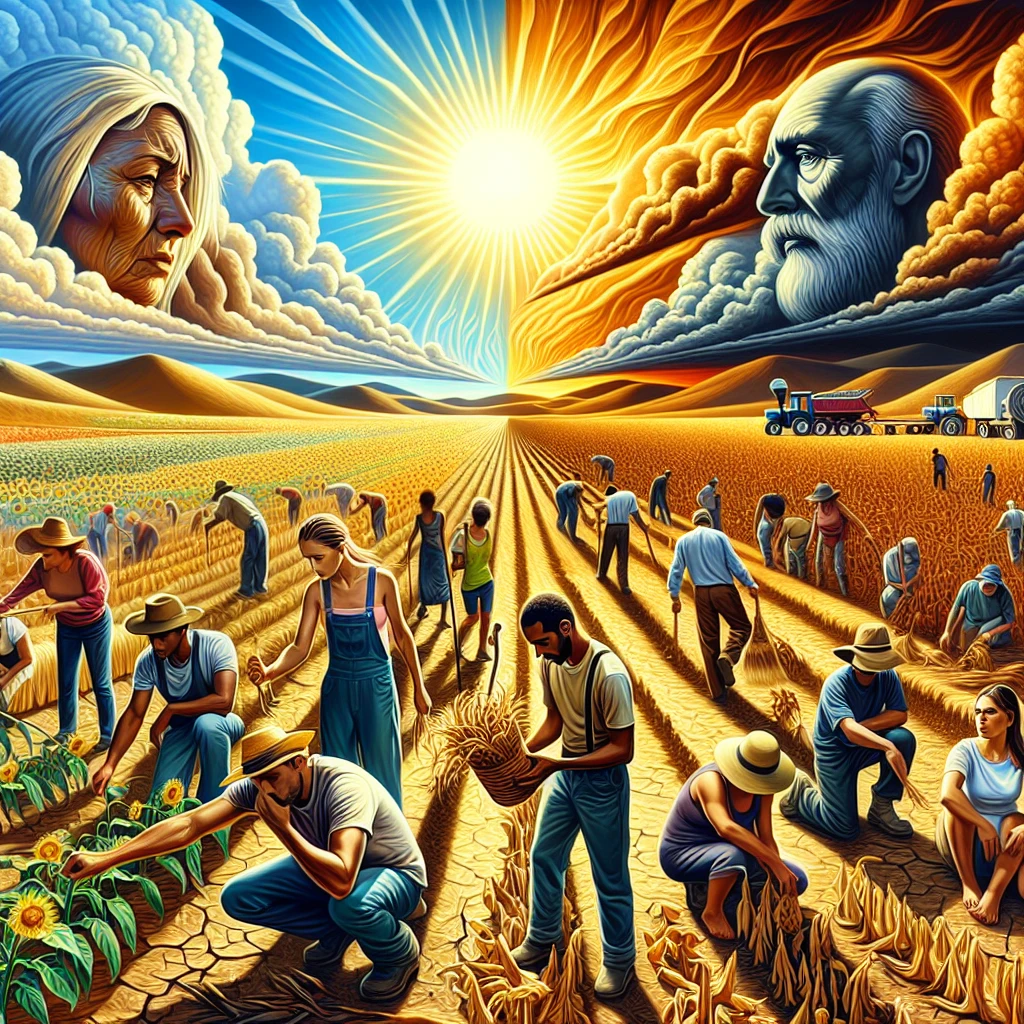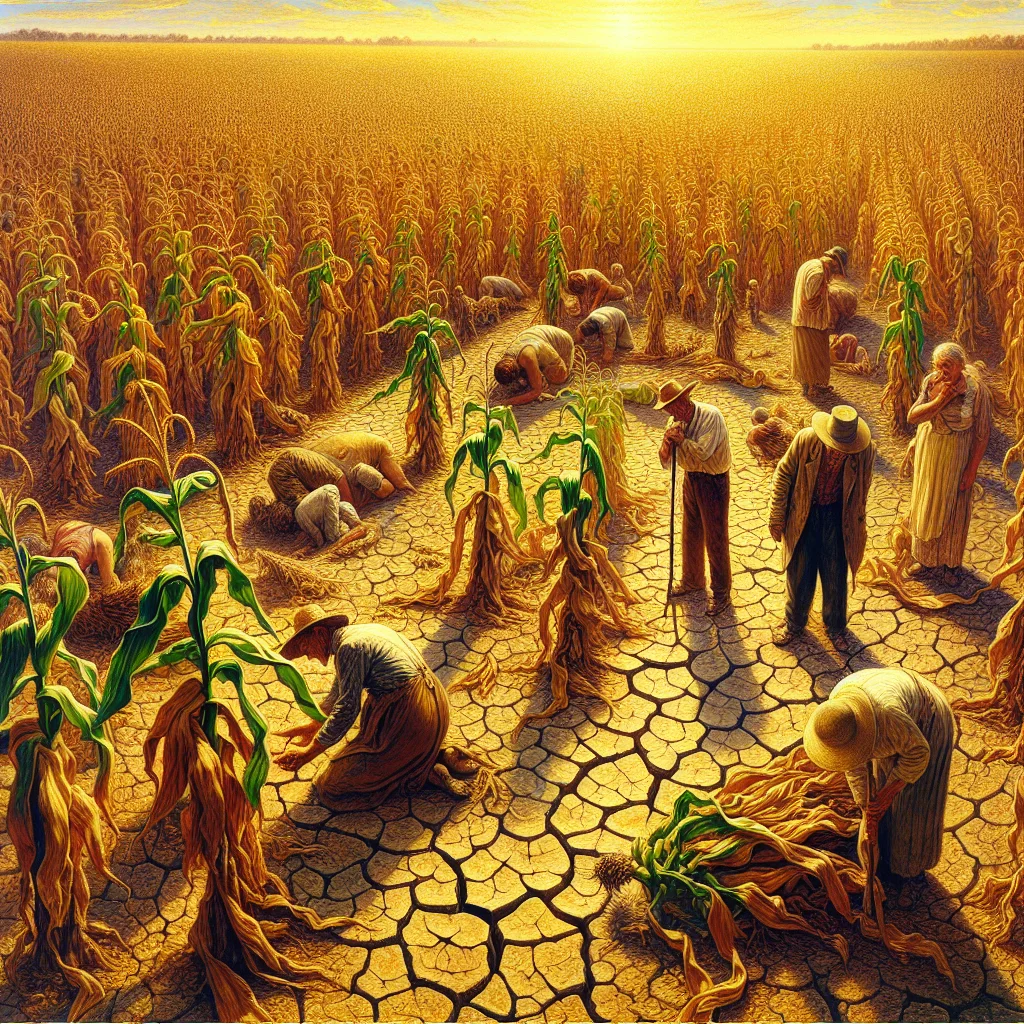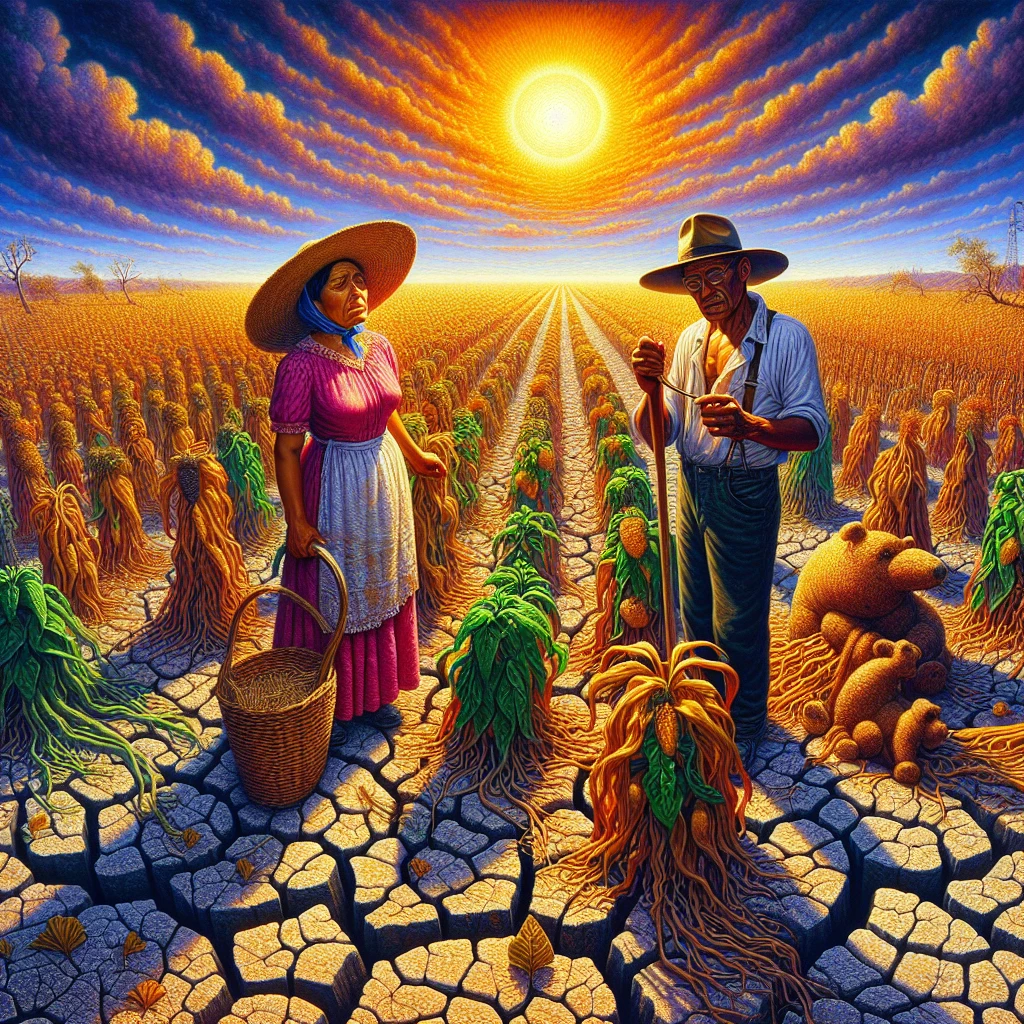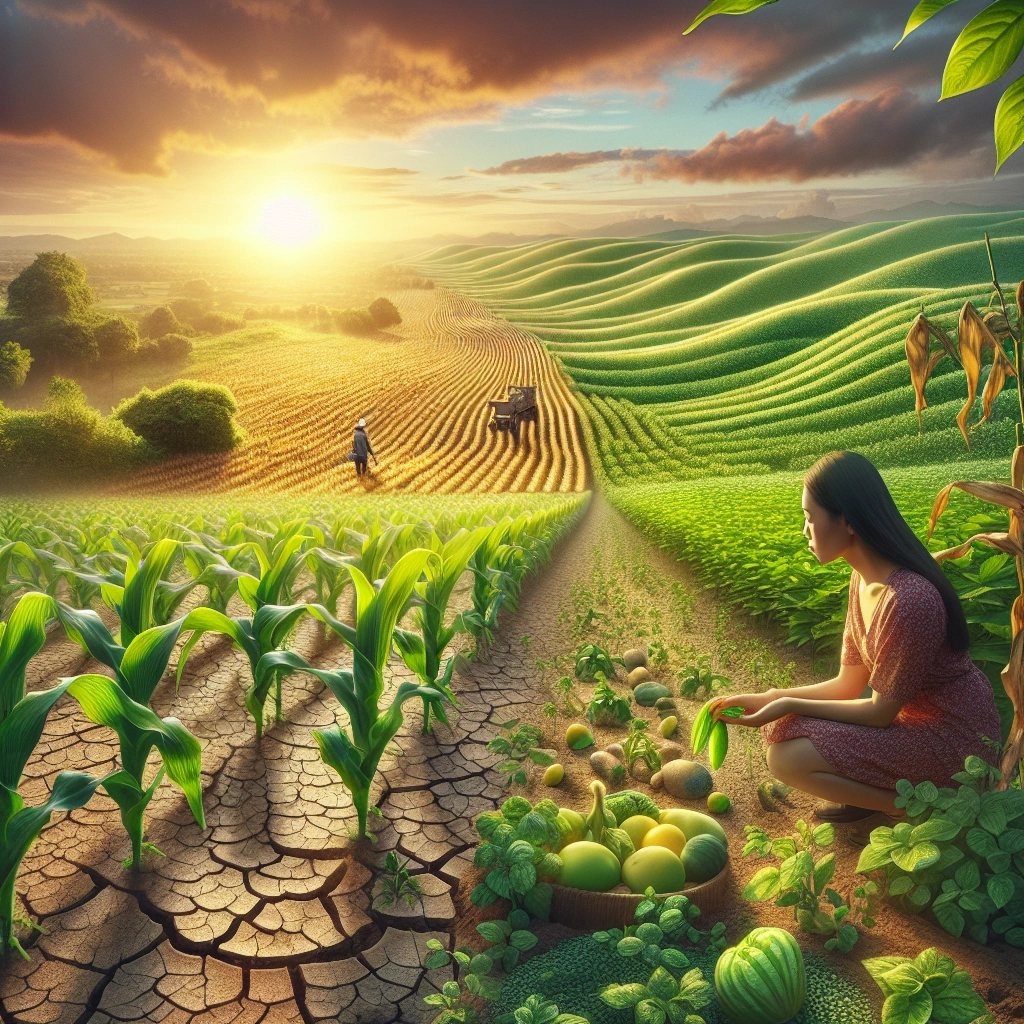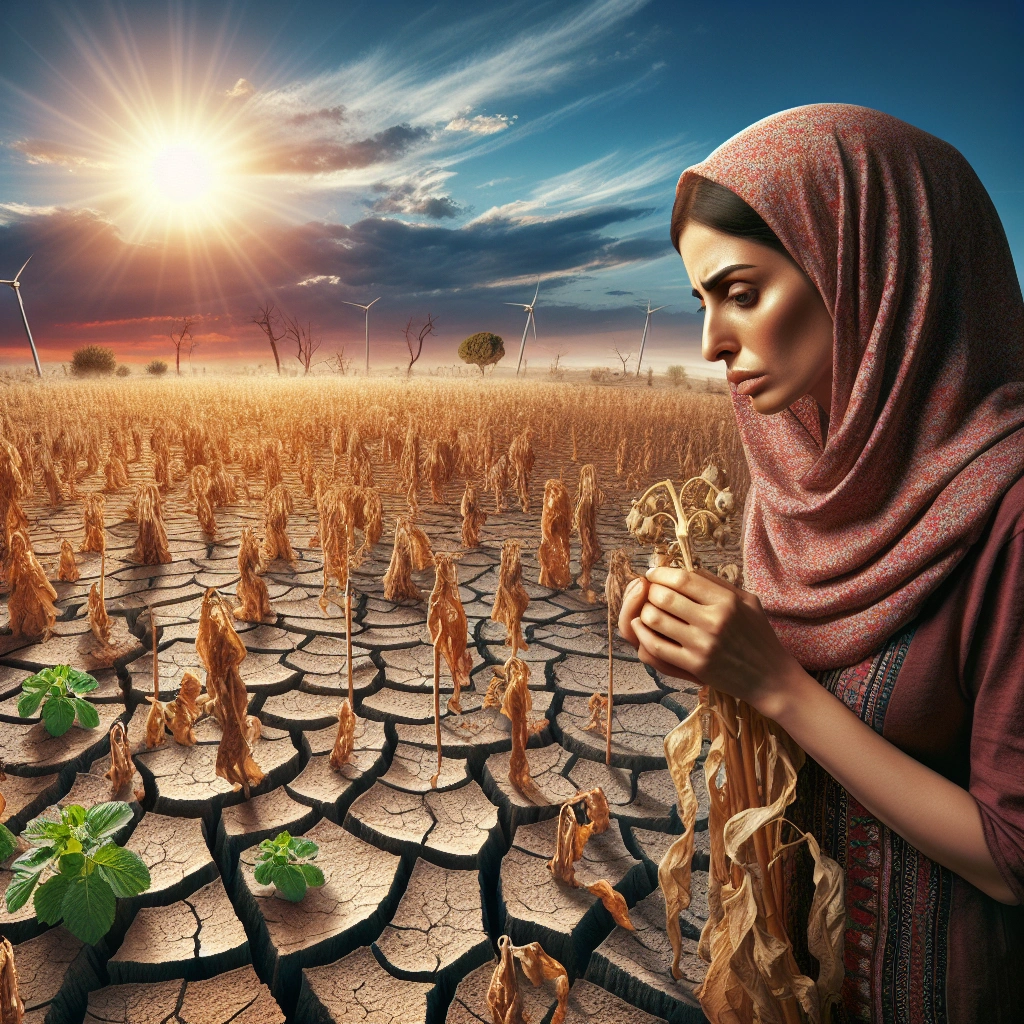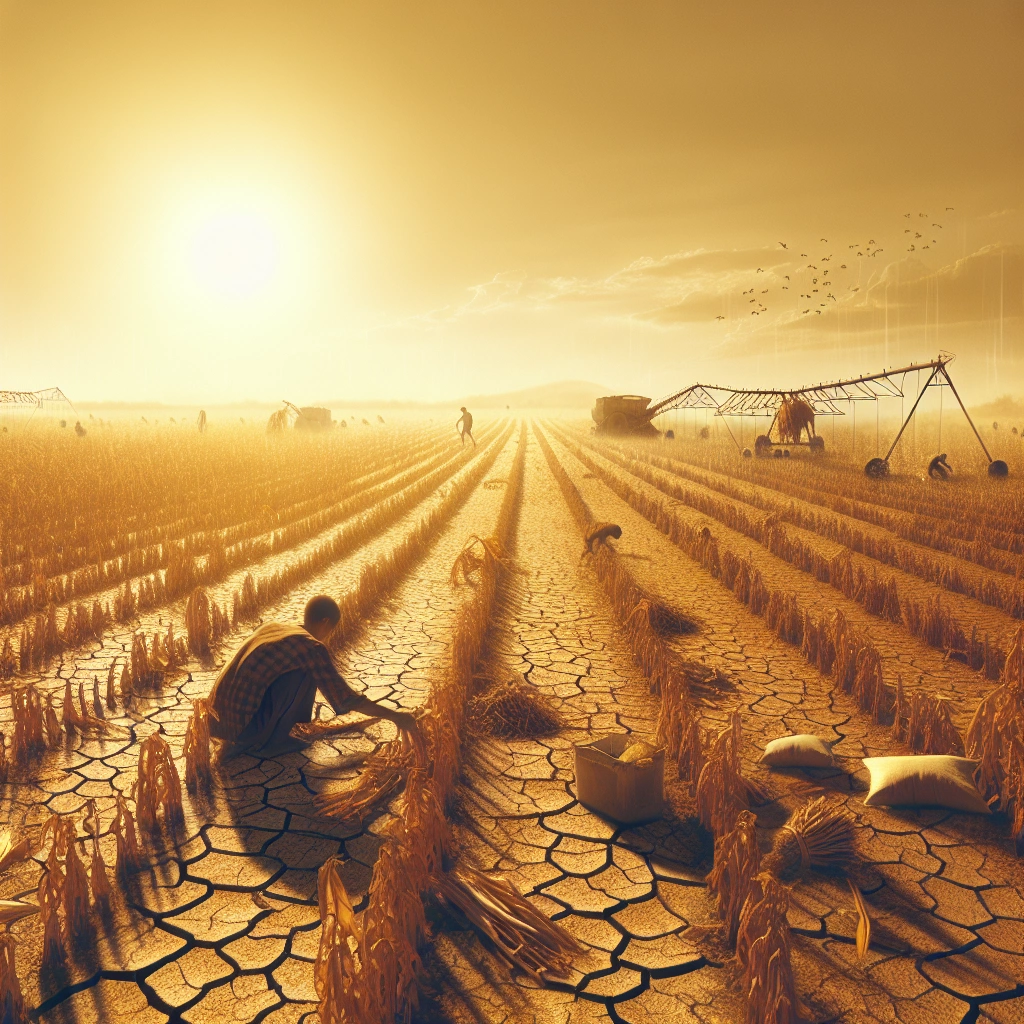

Climate change refers to long-term shifts in temperatures and weather patterns, which can significantly impact the growth and development of crops. Changes in temperature, rainfall, and frost-free days can lead to longer growing seasons, or conversely, hinder farming practices and reduce crop yields.
These shifts in weather patterns can make it more difficult to maintain and grow crops in regions that rely heavily on agriculture for food production.
Understanding the impact of climate change on crops is important for ensuring food security and addressing agricultural challenges. As climate change continues to alter temperature and weather patterns, it is essential to assess how these changes can affect agricultural productivity.
Changes in precipitation, extreme weather events, and shifts in habitat ranges can all have significant implications for crop growth and overall food supply. It is crucial to recognize and study the impact of climate change on crops in order to develop effective adaptation and mitigation strategies for the agricultural sector.
Climate change has the potential to disrupt food availability, reduce access to food, and affect food quality, as well as harm crop production. The interconnectedness of the global food system means that impacts on crop yields in one region can have far-reaching consequences worldwide.
Therefore, understanding and addressing the effects of climate change on crops is vital for sustainable agriculture and food supply.
Check out this Youtube video: “Climate Change Could Affect Global Agriculture Within 10 Years” and learn how climate change affects crops and global agriculture.
The Science Behind Climate Change and Its Impact on Crops
As greenhouse gas emissions continue to rise due to human activities such as burning fossil fuels, they blanket the Earth, trapping the sun’s heat and leading to global warming. This phenomenon directly affects crops as warmer temperatures can disrupt the delicate balance required for optimal plant growth and reproduction.
Rising temperatures have a profound impact on crops, influencing their growth, development, and yield. For instance, in some areas, warming temperatures can lead to a decrease in crop yields, especially for crops with specific optimal temperature requirements for growth and reproduction.
Changing rainfall patterns due to climate change can also significantly impact crop growth and productivity. Alterations in seasonality and distribution of precipitation may lead to excess water during off seasons and limited water during critical crop growth periods, necessitating more comprehensive water management strategies throughout the year.
An example of the alteration of growing seasons can be observed in the changing bloom times of plants and the emergence of pollinators like bees and butterflies. If mismatches occur between plant blooming and pollinator emergence due to climate-induced alterations, pollination rates could decrease, affecting crop yields.
| Crop | Impact of Rising Temperatures |
|---|---|
| Wheat | Reduced yields |
| Corn | Altered growth patterns |
| Rice | Challenged reproductive processes |
The science behind climate change’s impact on crops is multi-faceted, encompassing greenhouse gas emissions, rising temperatures, changing rainfall patterns, and altering growing seasons. These factors collectively pose significant challenges to global agricultural systems, necessitating proactive adaptation and management strategies to ensure food security in a changing climate.
How Does Climate Change Affect Crops: Impacts on Agriculture
Decreased crop yields
Extreme temperatures and erratic precipitation patterns due to climate change can lead to decreased crop yields. For example, intense heat and prolonged droughts can stunt plant growth and reduce the overall agricultural output, impacting the supply of essential food crops.
Increased susceptibility to pests and diseases
Climate change contributes to the proliferation of pests and diseases in crops. Warmer temperatures create favorable conditions for the rapid expansion of pests, resulting in more frequent and severe infestations.
Additionally, the extended survival periods of these pests further exacerbate crop vulnerability.
Changes in soil quality and fertility
Continued climate change can lead to alterations in soil quality and fertility, affecting agricultural productivity. Decreasing soil moisture due to climate variations can necessitate increased irrigation, impacting soil health and potentially leading to desertification, which significantly impacts food production.
Alterations in nutritional content of crops
As a consequence of climate change, the nutritional content of crops may undergo alterations. Changes in growing conditions, such as temperature and water availability, can impact the nutrient composition of crops, affecting their overall nutritional value.
Understanding the Economic Consequences of Climate Change on Crops
Impact on global food supply
- Climate change, with its erratic weather patterns, poses a significant threat to the global food supply. The increase in extreme weather events like droughts, floods, and heatwaves can lead to a decline in crop yields, diminishing the availability of food at a global level. This reduced food supply can directly impact both developing and developed nations, leading to food shortages and heightened food insecurity globally.
Economic losses for farmers and agricultural industries
- The impact of climate change on crops results in substantial economic losses for farmers and agricultural industries. Unpredictable weather conditions can damage crops, leading to a decrease in productivity and revenue for farmers. Additionally, increased expenses for irrigation and pest control further contribute to financial strain. Agricultural industries, reliant on consistent crop yields, face heightened financial risk, impacting the overall economic stability of the sector.
Food price inflation and its effects on food security
- Climate change-induced disruptions in crop production contribute to food price inflation, causing significant effects on global food security. Reduced crop yields lead to higher production costs, subsequently elevating food prices. This inflation poses challenges for vulnerable populations, limiting their access to essential food items and exacerbating food insecurity.
Displacement of agricultural laborers
- Climate change-related challenges in agriculture can result in the displacement of agricultural laborers. With reduced crop yields and economic losses, farmers may struggle to sustain employment opportunities, leading to the displacement of agricultural workers. This can have widespread social and economic ramifications, with the potential to disrupt livelihoods and exacerbate unemployment in rural communities.
| Climate Change Impact Summary | |
|---|---|
| Impact | Consequences |
| Global Food Supply | Declining crop yields |
| Economic Losses | Financial strain for farmers and industries |
| Food Price Inflation | Reduced access and affordability |
| Displacement of Laborers | Unemployment in agricultural sector |
The economic consequences of climate change on crops encompass a broad spectrum of challenges, from food supply disruptions to financial strain for farmers and industries, exacerbating food price inflation and leading to the displacement of agricultural laborers. Addressing these issues requires comprehensive strategies and collaborative efforts to build resilience and mitigate the impact of climate change on agricultural systems.
How Does Climate Change Affect Crops: Implications for Food Security
Increased risk of food shortages
Extreme weather events like floods and droughts, intensified by climate change, pose a significant risk to food production, leading to crop damage and reduced yields. For example, heavy precipitation can erode soil and deplete its nutrients, hindering the growth of crops and impacting food availability.
Effects on vulnerable populations
Vulnerable populations, especially in Sub-Saharan Africa, South Asia, and Southeast Asia, are most affected by climate impacts on food security. Around 80% of the global population at risk from crop failures and hunger due to climate change resides in these regions, where farming families are disproportionately poor and vulnerable.
Potential for social and political instability
The potential for social unrest and political instability is heightened by the impact of climate change on food security. More competition for natural resources due to reduced agricultural productivity can lead to greater political instability and uncertain government policies, thus increasing the risk of social and political conflicts.
Importance of developing resilient farming practices
Developing resilient farming practices is crucial in mitigating the effects of climate change on crops. Implementing strategies like crop diversification, soil conservation, and sustainable water management can help farmers adapt to the changing climate, ensuring food security and stability in agricultural production.
Adapting Agricultural Practices to Mitigate the Impact of Climate Change
Implementation of sustainable farming techniques
Sustainable farming techniques play a crucial role in mitigating the impact of climate change on crops. Practices such as organic farming, crop rotation, and integrated pest management not only enhance soil health and fertility but also contribute to reducing greenhouse gas emissions.
Adopting agroforestry, where trees are integrated into agricultural land, provides shade and enhances soil moisture, offering a sustainable solution to climate change effects on crop production.
Development of drought-resistant crop varieties
The development of drought-resistant crop varieties is a paramount strategy in combating the adverse effects of climate change on crops. Research and genetic engineering have paved the way for the creation of crop varieties that can thrive in arid and water-stressed conditions.
For instance, genetic modifications of wheat and barley have yielded promising results, enhancing their resilience to prolonged drought periods, ensuring sustained agricultural productivity despite changing environmental conditions.
Utilization of precision agriculture technologies
Precision agriculture technologies have revolutionized the way crops are cultivated, offering innovative solutions to mitigate the impact of climate change. Adoption of GPS-guided tractors, drones for aerial monitoring, and IoT sensors enable farmers to optimize water and fertilizer usage, minimize waste, and respond promptly to climate-induced challenges.
These advanced technologies contribute to sustainable and resilient crop production, aligning agriculture with the changing climate dynamics.
Importance of soil conservation and water management
Soil conservation and water management are fundamental aspects in adapting agricultural practices to combat the effects of climate change on crops. Employing conservation tillage methods, such as no-till or reduced tillage, helps preserve soil structure, reduce erosion, and enhance carbon sequestration.
Additionally, efficient water management through drip irrigation systems and rainwater harvesting ensures optimal water usage, particularly in regions experiencing erratic precipitation patterns due to climate change.
| Sustainable Farming Techniques | Drought-Resistant Crop Varieties | Precision Agriculture Technologies | Soil Conservation and Water Management |
|---|---|---|---|
| Organic farming | Genetic modification of wheat and barley | GPS-guided tractors | Conservation tillage methods |
| Agroforestry | Research in genetic engineering | Drones for aerial monitoring | Efficient water management techniques |
| Crop rotation | Resilience to prolonged drought | IoT sensors | Rainwater harvesting |
Policy and Legislative Actions to Address Climate Change and Its Impact on Crops
Government support for climate-resilient agriculture
Climate change poses a significant threat to crop production through extreme weather events and changing pest patterns. The government can support climate-resilient agriculture by providing financial incentives for farmers to adopt sustainable practices, such as crop diversification, conservation tillage, and water management strategies.
Additionally, investing in research and development of resilient crop varieties and providing insurance programs for farmers facing climate-related losses are crucial steps to mitigate the impact of climate change on crops.
International cooperation on environmental and agricultural policies
International cooperation plays a vital role in addressing the impacts of climate change on crops. Collaborative efforts can facilitate the sharing of best practices, technology transfer, and coordinated response to global challenges.
Aligning environmental and agricultural policies across nations can foster sustainable agricultural practices, conservation of natural resources, and the reduction of greenhouse gas emissions in agriculture, thereby safeguarding crop productivity in the face of climate change.
Investment in renewable energy and sustainable farming practices
Investment in renewable energy and sustainable farming practices is essential to mitigate the adverse effects of climate change on crops. Transitioning to renewable energy sources reduces carbon emissions, while sustainable farming practices, such as agroforestry, organic farming, and precision agriculture, promote soil health, water conservation, and biodiversity.
These investments contribute to climate resilience in agriculture, ensuring food security despite the challenges posed by climate change.
Importance of education and awareness on climate-smart agriculture
Educating farmers and the broader community about climate-smart agriculture is crucial to building resilience against the impact of climate change on crops. Training programs and extension services can provide farmers with knowledge and tools to implement climate-smart practices, such as efficient irrigation techniques, soil conservation, and integrated pest management.
Raising awareness about the significance of sustainable agricultural practices can drive widespread adoption and create a supportive environment for climate-resilient crop production.
Summary Policy and Legislative Actions
| Action | Impact |
|---|---|
| Financial incentives for sustainable practices | Promotes adoption of climate-resilient agriculture |
| International collaboration on best practices | Facilitates knowledge sharing and technology transfer |
| Investment in renewable energy sources | Reduces carbon emissions from agricultural activities |
| Education and awareness programs | Promotes adoption of climate-smart agricultural practices |
Let’s make our crops great again, folks! We need to protect our agricultural sector from the effects of climate change.
It’s time to implement strong policies and legislative actions to ensure a resilient and sustainable future for our crops.
How Does Climate Change Affect Crops: The Role of Technology and Innovation
Advances in agricultural technology to mitigate climate impact
As climate change continues to impact crop yields, advanced agricultural technology plays a crucial role in mitigating these effects. For instance, precision farming techniques, such as automated practices and robotics, enable farmers to optimize resource usage and minimize environmental impact.
Additionally, the development of hydrogen-powered fertilizer production contributes to sustainable crop cultivation while reducing greenhouse gas emissions.
Use of climate data and predictive analytics
In addressing the impact of climate change on crops, the utilization of climate data and predictive analytics is invaluable. By leveraging these tools, farmers can anticipate shifts in weather patterns, optimize planting schedules, and adapt crop varieties to changing environmental conditions.
Furthermore, the integration of predictive analytics allows for proactive resource management and mitigates potential yield losses due to climate-related factors.
Importance of remote sensing and satellite imagery
Remote sensing and satellite imagery play a pivotal role in combating the adverse effects of climate change on crops. These technologies enable early detection of crop diseases, nutrient deficiencies, and water stress, empowering farmers to implement targeted interventions and optimize agricultural practices.
By harnessing the power of remote sensing, farmers can make informed decisions to enhance crop health and maximize yields in the face of changing climate conditions.
Innovative solutions in crop protection and management
Innovative solutions in crop protection and management are essential for safeguarding agricultural productivity amidst climate change. For example, advancements in bio-based pesticides and sustainable pest management practices offer effective alternatives to traditional chemical-intensive approaches.
Furthermore, integrated crop management strategies, incorporating biological control measures and soil health improvement, contribute to resilient and sustainable agricultural systems.
| Technology Solution | Benefits |
|---|---|
| Precision farming techniques | Optimize resource usage and minimize environmental impact |
| Predictive analytics | Anticipate shifts in weather patterns and mitigate potential yield losses |
| Remote sensing and satellite imagery | Early detection of crop diseases and targeted interventions |
| Innovative crop protection solutions | Sustainable pest management and resilient agricultural systems |
The integration of advanced technology and innovative approaches in agricultural practices represents a pivotal response to the challenges posed by climate change, ensuring the resilience and sustainability of crop production in the face of evolving environmental conditions.
The Role of Farmers in Combating the Impact of Climate Change on Crops
Adoption of climate-resilient farming practices
Farmers play a crucial role in combating the impact of climate change by adopting resilient farming practices such as conservation agriculture, adjusting planting times, and investing in short and long-term storage infrastructure. By incorporating climate-smart agriculture, which is an integrated approach addressing cropland, livestock, and fisheries, farmers can effectively adapt to changing climate patterns and ensure the sustainability of their crops.
Importance of crop diversification
Crop diversification is essential for farmers as it allows them to spread production and economic risk across a broader range of crops, reducing financial vulnerability. By preserving the diversity of crops, farmers can create climate-resilient agriculture, minimize greenhouse gas emissions, and guarantee food security for future generations.
Intercropping, for instance, not only reduces the risk of crop failure but also enhances dietary diversity for small-scale farmers.
Collaborative efforts in sustainable agriculture
Collaborative efforts between farmers and other stakeholders are pivotal in promoting sustainable agriculture. Strong collaboration fosters the success of climate-smart agriculture initiatives, enabling the exchange of knowledge, resources, and best practices.
The United States Department of Agriculture (USDA) has taken significant steps to promote the Agriculture Innovation Mission for Climate (AIM4C), aiming to boost public and private investment in climate-smart agriculture and food systems innovation on a global scale.
Resilience building and community-based initiatives
Resilience building and community-based initiatives are instrumental in fortifying the agricultural sector against the adverse effects of climate change. Investments in climate resilience through sustainable agriculture can provide long-term stability for farmers and agricultural systems.
Furthermore, community-based initiatives that prioritize collaboration have been identified as essential strategies for sustainable agriculture, paving the way for more extensive and successful climate adaptation efforts.
The active involvement of farmers in adopting climate-resilient practices, embracing crop diversification, engaging in collaborative efforts, and initiating community-based resilience-building initiatives is paramount in mitigating the impact of climate change on crops.
How Does Climate Change Affect Crops: Case Studies and Real-life Examples
Impact of climate change on specific crops (e.g., wheat, rice, coffee)
Climate change has a significant impact on specific crops, such as wheat, rice, and coffee. For instance, higher temperatures and increased carbon dioxide concentrations in the air are causing decreased nutrient levels like iron, zinc, and protein in these crops. Studies have shown that the temperature variations adversely affect rice cultivation, while changes in average rainfall influence the production of wheat, corn, and rice. A NASA study also predicts that climate change may affect the production of maize (corn) and wheat as early as 2030.
Success stories in adapting to climate change
Amid these challenges, there are success stories in adapting to climate change in agriculture. Farmers and ranchers have been adapting to the changing climate by altering their crop selections and adjusting the timing of their field operations. Integrating diverse agricultural systems, such as crop-livestock-forestry systems, has proven effective in enhancing resilience to climate change. Furthermore, the implementation of drought-resistant crops and the adoption of better water management techniques have shown promising results in mitigating the impacts of a shifting climate.
Examples of community-driven climate resilience projects
Community-based climate resilience projects have been instrumental in addressing the challenges posed by climate change. One example is the initiative involving indigenous women solar engineers who are bringing light to rural areas. Additionally, grants are being provided to community-based organizations and non-governmental organizations to support projects tackling climate change, encouraging local participation and capacity building.
Lessons learned from regions severely affected by climate change
Regions severely affected by climate change offer valuable lessons for the agricultural sector. For instance, in sub-Saharan Africa where rainfall has decreased, farmers have been adapting by returning to native plants such as jackfruits and focusing on fast-growing varieties like legumes. Moreover, the implementation of better water management practices, including the optimization of irrigation methods, has been crucial in regions with scarce water resources.
| Climate Change Impact | Adaptation Strategies |
|---|---|
| Decreased nutrient levels in crops | Integration of diverse agricultural systems |
| Adverse effects on rice and wheat cultivation | Implementation of drought-resistant crops |
| Community-driven projects empowering locals | Grants to support climate resilience initiatives |
| Lessons from sub-Saharan Africa | Embracing native plants and optimizing water management |
Assessing the Psychological and Emotional Impact of Climate Change on Farmers
Stress and anxiety related to climate uncertainty
Climate uncertainty contributes to elevated stress and anxiety levels among farmers. The unpredictability of weather patterns and extreme climate events create a constant sense of uncertainty and fear of crop failure, impacting farmers’ mental well-being.
Mental health challenges in the agricultural sector
The agricultural sector faces significant mental health challenges due to climate change. Farmers experience higher rates of anxiety, depression, and grief as they grapple with the repercussions of climate change on their livelihoods, including crop damage and financial instability.
Importance of support networks and mental health resources
Support networks and mental health resources are crucial for farmers facing the emotional toll of climate change. Access to counseling services, support groups, and community outreach programs can provide farmers with the necessary emotional support and coping mechanisms to navigate the challenges they encounter.
Strategies for improving farmer resilience and well-being
Implementing resilience-building strategies is essential for improving farmer well-being in the face of climate change. This includes promoting sustainable agricultural practices, providing financial assistance for crop protection, and fostering a sense of community to combat the isolation often felt by farmers.
| Support Measures | Description |
|---|---|
| Community Outreach Programs | Facilitating emotional support and counseling for farmers facing climate-related stress and anxiety. |
| Sustainable Agriculture Practices | Encouraging the adoption of resilient farming methods to mitigate the impact of climate change on crops and overall mental well-being. |
| Financial Aid for Crop Protection | Offering financial assistance and risk management tools to protect farmers from the economic impact of climate-related events. |
By acknowledging and addressing the psychological and emotional impact of climate change on farmers, we can work towards creating a supportive environment that promotes their mental well-being and resilience in the face of adversity.
The Ethical Considerations of Climate Change and Its Impact on Crops
Distribution of climate change impacts across different regions
Climate change affects different regions in varying ways. For instance, some areas may experience more severe droughts, leading to reduced crop yields and food shortages.
At the same time, others may face increased rainfall and flooding, damaging crops and disrupting agricultural activities. These impacts highlight the diverse challenges posed to farming communities across the globe.
Responsibilities of developed nations in addressing climate change
Developed nations bear a significant responsibility in addressing climate change due to their historical contributions to greenhouse gas emissions. They are obligated to provide financial support and share technology with developing countries to enable them to adapt and mitigate the effects of climate change.
By honoring commitments made under global agreements like the Paris Agreement, they can spearhead efforts to combat climate change and protect agricultural ecosystems.
Fair trade and ethical sourcing in relation to climate resilience
In the context of climate resilience, fair trade and ethical sourcing play a crucial role in ensuring sustainable agricultural practices. By adhering to fair trade standards, farmers can improve soil and water quality, reduce greenhouse gas emissions, and protect biodiversity.
In doing so, they contribute to building climate-resilient agricultural systems and promote environmental sustainability.
Environmental justice and the impact on marginalized communities
Climate change disproportionately affects marginalized communities, exacerbating social and economic disparities. These communities often face the brunt of extreme weather events, food insecurity, and disrupted livelihoods.
Environmental justice demands that efforts to address climate change prioritize the needs of these vulnerable populations and empower them to adapt to the changing agricultural landscape.
Climate Change and Crops: The Intersection of Science and Policy
The role of scientific research in informing policy decisions
Scientific research plays a crucial role in informing policy decisions regarding the impact of climate change on crops. Studies on the effects of temperature, precipitation changes, and extreme weather events provide valuable insights into the challenges faced by agriculture.
For instance, research from the Intergovernmental Panel on Climate Change (IPCC) has highlighted the vulnerability of crop yields to changing climate patterns, urging policymakers to consider innovative adaptation and mitigation strategies.
The importance of evidence-based policy-making
Evidence-based policy-making is essential in addressing the complex challenges posed by climate change on crop production. It involves integrating scientific findings into the policy framework, ensuring that interventions are well-informed and effective.
By leveraging data-driven approaches, policymakers can implement targeted initiatives such as promoting drought-resistant crops or investing in sustainable farming practices to mitigate the adverse effects of climate change on crop yields.
Challenges in translating scientific findings into effective policies
One of the key challenges lies in translating scientific findings into actionable policies that can effectively safeguard crop production in the face of climate change. This involves navigating political and economic considerations while ensuring that the policy prescriptions align with the scientific evidence.
Balancing the interests of various stakeholders and addressing potential conflicts between short-term economic gains and long-term sustainability goals poses a significant obstacle in policy formulation.
Case studies of successful policy interventions in agriculture
Several successful policy interventions have demonstrated the potential of evidence-based approaches in addressing the impact of climate change on crops. For instance, initiatives promoting agroforestry systems and precision agriculture have shown remarkable resilience to climate variability, contributing to enhanced crop yields and environmental sustainability.
Additionally, subsidy programs supporting the adoption of innovative technologies, such as weather-resistant seeds and efficient irrigation practices, have proven to be instrumental in bolstering agricultural resilience to changing climatic conditions.
| Policy Intervention | Impact on Agriculture |
|---|---|
| Agroforestry systems | Increased resilience to climate variability, improved soil health, and enhanced biodiversity |
| Precision agriculture | Enhanced crop yields, optimized resource utilization, and reduced environmental footprint |
| Technology subsidies | Adoption of climate-resilient farming techniques, improved productivity, and mitigation of climate-induced risks |
These case studies exemplify the potential of evidence-based policy-making in advancing sustainable agricultural practices and safeguarding crop productivity amidst the challenges posed by climate change.
All in all, the intersection of science and policy in addressing the impact of climate change on crops requires a concerted effort to leverage scientific research in informing evidence-based policies, overcome implementation challenges, and draw inspiration from successful case studies to build a resilient agricultural landscape for the future.
Public Perception and Awareness of Climate Change’s Impact on Crops
The role of media in shaping public understanding
The media plays a crucial role in shaping public understanding of how climate change affects crops. Through factual reporting and increased coverage of climate change, the media has the power to educate and inform the public about the impact of changing weather patterns on crop production.
By highlighting the real-time effects of extreme weather events like droughts, floods, and heatwaves on agriculture, the media can raise awareness and encourage a more informed public discourse on the topic.
Importance of enhancing climate literacy
Enhancing climate literacy is essential in ensuring that individuals have a deep understanding of how climate change directly impacts crops and food production. By investing in education and promoting climate literacy, people can better grasp the intricate relationship between climate and agriculture.
This knowledge empowers communities to adapt to changing conditions, mitigate risks, and contribute to sustainable solutions that safeguard crop resilience in the face of climate change.
Changing consumer behaviors and food choices
Consumer behavior and food choices play a significant role in addressing the impact of climate change on crops. When individuals make environmentally conscious purchases and opt for sustainably sourced and climate-resilient crops, they contribute to a more sustainable and resilient food supply chain.
By being mindful of their food choices, consumers can support agricultural practices that are adaptable to changing climates, fostering a more climate-resilient food system.
The role of advocacy and community engagement in climate action
Advocacy and community engagement are pivotal in driving climate action and promoting agronomic practices that can mitigate the impact of climate change on crops. When communities come together to advocate for sustainable farming methods, climate-smart agriculture, and policy changes that support resilient food production, they can contribute to transformative change.
By engaging with local farmers, agricultural organizations, and policymakers, communities can drive impactful initiatives that protect crops from the adverse effects of a changing climate.
| Factors | Role |
|---|---|
| Media | Shape public understanding through factual reporting |
| Climate Literacy | Empower individuals to understand the impact |
| Consumer behavior | Influence sustainable food choices |
| Advocacy and community engagement | Drive climate action for resilient crops |
The public’s perception and awareness of climate change’s impact on crops can be significantly influenced by the media, climate literacy, consumer behavior, and community engagement. By leveraging these factors, we can collectively work towards building a more resilient and sustainable agricultural sector that is better equipped to withstand the challenges posed by climate change.
Overcoming Obstacles: Barriers to Implementing Climate-Resilient Agriculture
Economic challenges in transitioning to sustainable farming
Farmers face economic challenges during the transition to sustainable farming. This shift may result in lower yields and temporary setbacks in profitability.
For instance, the initial investment in sustainable farming practices may strain the financial stability of farmers, impacting their livelihoods. Not to mention, the costs associated with acquiring eco-friendly equipment and materials can further add to the economic burden.
Political and regulatory barriers to climate-smart agriculture
Political and regulatory barriers hinder the adoption of climate-smart agriculture. In many regions, the lack of supportive policies and adequate governmental incentives restrict farmers from implementing sustainable practices.
Additionally, complex regulations and bureaucratic red tape create obstacles for farmers seeking to integrate climate-resilient techniques, delaying progress in combating the impact of climate change on crops.
Lack of access to resources and technology in vulnerable communities
Vulnerable communities often lack access to essential resources and advanced agricultural technology. This deprivation hampers their ability to cope with the adverse effects of climate change on crops.
For example, inadequate irrigation systems and limited access to climate-resilient crops impede the potential for sustainable agriculture in these communities, exacerbating the challenges they face.
Need for cross-sector collaboration and partnerships
The need for cross-sector collaboration and partnerships is crucial in implementing climate-resilient agriculture. Collaborative efforts between government agencies, research institutions, and private organizations can facilitate knowledge-sharing and resource allocation, fostering the exchange of innovative techniques and technologies to combat the impact of climate change on crops.
This collaboration is pivotal in ensuring holistic support for farmers and communities, driving sustainable agricultural practices.
The Future of Agriculture in the Face of Climate Change
The role of young farmers and future generations in climate adaptation
Young farmers and future generations play a pivotal role in climate adaptation through innovative agricultural practices. They bring fresh perspectives and technological adeptness to address the challenges brought about by climate change.
For example, embracing precision agriculture and sustainable farming methods can enhance resilience to extreme weather conditions and reduce the environmental impact of farming.
Importance of continued research and innovation
Continued research and innovation are crucial in developing climate-resilient crops and agricultural technologies. The exploration of climate-smart agriculture, integrating advanced AI, machine learning, and precision agriculture, can lead to more sustainable and efficient farming practices.
For instance, the development of drought-resistant crops and precision irrigation systems can mitigate the impact of changing climate patterns on crop yields.
Global collaboration and solidarity in addressing climate challenges
Global collaboration and solidarity are essential in addressing climate challenges within the agricultural sector. Shared knowledge, resources, and technology transfer between nations can enhance adaptability to climate change.
Through collaborative efforts, countries can develop joint initiatives to counter the adverse effects of climate change on agriculture and food security at a global scale.
The potential for sustainable and climate-resilient food systems
Embracing sustainable agriculture practices and climate-resilient food systems holds great potential for mitigating the impact of climate change on crop production. For instance, no-till farming, vertical farming, and the adoption of climate-resilient crops offer promising avenues for reducing greenhouse gas emissions and enhancing agricultural sustainability.
Building climate-resilient food systems can ensure food security even in the face of unpredictable climate patterns.
| Climate Adaptation Initiatives | Description |
|---|---|
| Precision Agriculture | Utilizes technology like GPS and IoT to optimize inputs and increase yields. |
| Development of Climate-Resilient Crops | Focuses on breeding crops with resistance to heat, drought, pests, and diseases. |
| International Knowledge Sharing | Encourages collaborative efforts and knowledge exchange between countries for climate adaptation in agriculture. |
These initiatives highlight the imperative need for proactively engaging young farmers, fostering research and innovation, promoting global collaboration, and developing sustainable food systems to counter the evolving challenges posed by climate change in agriculture.
Recommended Amazon Products for How Does Climate Change Affect Crops
Here’s a curated list of products that can help you understand and mitigate climate change’s impact on crops. These recommendations are based on their relevance to agriculture and positive customer reviews.
BOSCH GIS1000C Thermal Imaging Camera
This thermal imaging camera is an essential tool for farmers to monitor the impact of rising temperatures on their crops. With the ability to detect temperature differences and moisture levels, it helps in identifying stress in crops early on. The BOSCH GIS1000C Thermal Imaging Camera is a highly recommended product for understanding the effects of climate change on agriculture. Check it out on Amazon!


AcuRite 01512 Wireless Weather Station
The AcuRite Wireless Weather Station provides real-time data on temperature, humidity, and rainfall patterns, crucial for understanding changing weather patterns due to climate change. It enables farmers to make informed decisions about crop management and irrigation based on accurate weather information. With positive customer reviews, the AcuRite 01512 is a reliable choice for monitoring climate impact on crops. Check it out on Amazon!


Dr. Meter Soil Moisture Sensor Meter
The Dr. Meter Soil Moisture Sensor Meter helps farmers assess changes in soil quality and fertility due to climate change. With its easy-to-use design, it provides instant moisture readings, allowing for adjustments in irrigation and fertilization to maintain healthy crops. This product has received high ratings for its accuracy and affordability, making it a practical choice for farmers. Check it out on Amazon!


Top Recommended Product for How Does Climate Change Affect Crops
If you’re looking for the best solution for understanding climate change’s impact on crops, we highly recommend the BOSCH GIS1000C Thermal Imaging Camera. This advanced tool provides essential insights into temperature variations and moisture levels, helping farmers address the effects of climate change on their crops effectively.
Pros and Cons of Recommended Products
| Product | Pros | Cons |
|---|---|---|
| BOSCH GIS1000C Thermal Camera | – Accurate temperature detection | – Higher price point |
| – Advanced moisture level analysis | – Steeper learning curve for operation | |
| AcuRite 01512 Weather Station | – Real-time weather data monitoring | – Mounting and installation may be complex |
| – User-friendly interface | – Limited range of wireless transmission | |
| Dr. Meter Soil Moisture Sensor | – Instant soil moisture readings | – Build quality may be an issue |
| – Affordable | – Some users reported calibration issues |
Ready to enhance your understanding of climate change’s impact on crops? Check out BOSCH GIS1000C Thermal Imaging Camera today for the best results!


Conclusion
Climate change has various impacts on crops, including changes in temperature, precipitation patterns, and the frequency of extreme weather events, all of which can result in reduced crop yields and quality.
Furthermore, collective action and sustainable solutions are essential in mitigating the effects of climate change on crops, such as promoting sustainable farming practices, investing in climate-resilient crop varieties, and reducing greenhouse gas emissions from agricultural activities.
Lastly, there is a pressing need for policymakers, industry leaders, and individuals to work together in combating the impact of climate change on crops by implementing policies that support climate-resilient agriculture, investing in research and development of sustainable farming methods, and adopting environmentally friendly practices in food production and consumption.

